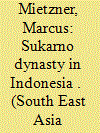| Srl | Item |
| 1 |
ID:
148552


|
|
|
|
|
| Summary/Abstract |
The relative newness of political dynasties in Thai society is often forgotten by scholars and observers. The majority of Thai political clans entered politics only after the 1973 student uprising. Their time in politics is also relatively short – only half of them managed to stay in power for more than two legislative terms. Historically, their instability was caused by frequent military coups, which interrupted the parliamentary institutions and electoral process. By the time they had succeeded in climbing to the top in the late 1990s, the political and economic landscape had been transformed in a way that seriously reduced their power. Tumultuous ideological conflict and the rise of mass movement after the 2006 military coup have further diminished the status and power of old political clans. This article traces the historical developments and the patterns of accumulation of the wealth and power of Thai political dynasties and explains how some families have been able to maintain their power while many others have failed.
|
|
|
|
|
|
|
|
|
|
|
|
|
|
|
|
| 2 |
ID:
148551


|
|
|
|
|
| Summary/Abstract |
At all levels of politics in Indonesia today, political families have a central place. The families of previous presidents and dynasties in regional and local politics have all been central to Indonesia’s decentralised and increasingly personality-driven democracy. This article presents preliminary work on a biographical study of one of Indonesia’s most prominent and enduring political dynasties, the Djojohadikusumo family, who have held positions of power in key national institutions across four generations. The study aims to improve our understanding of how this family has conceived itself within political structures as they have shifted over four generations. What characteristics of the dynasty can be identified as enabling its adaptability? How much do external and structural forces sustain the dynasty as a central player? And how much is it sustained by characteristics that are internal, historical, psychological and culturally specific to the family unit?
|
|
|
|
|
|
|
|
|
|
|
|
|
|
|
|
| 3 |
ID:
148550


|
|
|
|
|
| Summary/Abstract |
This article focuses on the history and current political relevance of the Sukarno dynasty in Indonesia. It analyses the reasons for the political longevity of the family, but also discusses internal and external pressures that have forced the dynasty to adopt new strategies to secure its survival. The article tests a number of assertions that political theorists have typically made about dynasties and their political parties: for instance, that they are institutionally weak, electorally unstable and have low levels of representativeness. I argue that the Sukarno family has been able to mitigate most of these much-discussed deficits, but has faced a series of succession crises that, if unresolved, threaten its long-term position in Indonesian politics.
|
|
|
|
|
|
|
|
|
|
|
|
|
|
|
|